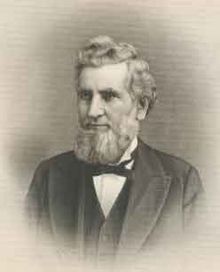John Watson Barr (December 17, 1826 – December 31, 1907) was a United States district judge of the United States District Court for the District of Kentucky.
John W. Barr | |
|---|---|
 | |
| Judge of the United States District Court for the District of Kentucky | |
| In office April 16, 1880 – February 21, 1899 | |
| Appointed by | Rutherford B. Hayes |
| Preceded by | William Hercules Hays |
| Succeeded by | Walter Evans |
| Personal details | |
| Born | John Watson Barr December 17, 1826 Versailles, Kentucky |
| Died | December 31, 1907 (aged 81) Louisville, Kentucky |
| Resting place | Cave Hill Cemetery Louisville, Kentucky |
| Political party | Whig Democratic Republican |
| Education | Transylvania University |
| Signature | |
| Military service | |
| Allegiance | |
| Branch/service | Home Guard |
| Years of service | 1861–1865 |
| Rank | Adjutant general |
| Unit | Louisville brigade |
| Battles/wars | American Civil War |
Education and career
editBarr was born in Versailles, Kentucky on December 17, 1826.[1] He was the son of William and Ann (Watson) Barr.[1] His father was a merchant who worked in both Versailles and Louisville, Kentucky.[1] Barr received his early education from private tutors and private schools in Woodford County, Kentucky.[1] He then matriculated to Transylvania University to study law.[1] Upon his graduation in 1847 he commenced practice in Versailles.[1] In 1854, he moved to Louisville and formed a law firm with Joseph B. Kinkead.[1] After eight years, the two dissolved the partnership by mutual consent, but remained friends.[2] Barr continued in private practice until 1864, when he formed a new law firm with John Kemp Goodloe.[2] Barr had begun advocating the gradual abolition of slavery as early as 1849.[1] When the Civil War commenced, he helped organize the Kentucky Home Guard and served as adjutant general of the Louisville brigade.[1] He was also involved in the organization of several Union regiments in Kentucky.[1] After the war, Barr returned to his law practice.[1] In 1868, Alexander Pope Humphrey joined the firm, which continued until Barr's appointment to a federal judgeship in 1880.[2]
Public career
editLike his father, Barr was associated with the Whig Party in his early life.[2] Following the dissolution of the Whig Party, he joined the Democratic Party.[1] After the formation of the Republican Party, he fervently adhered to that party.[3] From 1868 to 1870, Barr served as president of the Board of Louisville Sinking Fund Commissioners and served several terms on the Louisville City Council.[3] For twenty years, he was director of the Bank of Kentucky.[1]
Federal judicial service
editOn April 9, 1880, President Rutherford B. Hayes nominated Barr to the United States District Court for the District of Kentucky, replacing Judge William Hercules Hays.[1] He was confirmed by the United States Senate on April 16, 1880, and received his commission the same day.[1] Barr retired on February 21, 1899.[1]
Death
editBarr died on December 31, 1907, in Louisville at age 81 and was buried in Cave Hill Cemetery in Louisville.[1]
Family
editOn November 23, 1859, Barr married Susan P. Rogers.[1] The couple had seven children – John W. Barr Jr., Anna W. Barr, Caroline H. Barr, Susan R. Barr, Josephine P. Barr, Elise R. Barr, and Jason Rogers Barr.[3] The family attended College Street Presbyterian Church.[3]
References
editSources
edit- Biographical Cyclopedia of the Commonwealth of Kentucky. Chicago, Illinois: J.M. Gresham Company. 1896.
- "John Watson Barr (1826–1907)". History of the Sixth Circuit. United States Court of Appeals for the Sixth Circuit. Archived from the original on 2011-06-06. Retrieved 2011-05-29.
- John Watson Barr at the Biographical Directory of Federal Judges, a publication of the Federal Judicial Center.